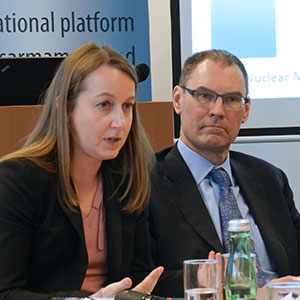
The Vienna Center for Disarmament and Non-Proliferation (VCDNP) and the Nuclear Threat Initiative (NTI) co-hosted a briefing on 31 January 2014 on the recently released 2014 version of the NTI Nuclear Materials Security Index. Dr. Page Stoutland and Ms. Samantha Pitts-Kiefer presented the new edition of the Index, as well as recommendations that NTI has developed in response to its key findings. The 2014 NTI Nuclear Materials Security Index is the second edition of a unique public assessment of global nuclear materials security conditions, first released in 2012. Developed with the Economist Intelligence Unit (EIU), the NTI Index is designed to encourage governments to take actions and provide assurances about the security of these materials. The 2012 NTI Index helped spark international discussions about priorities for strengthening nuclear security. The 2014 edition identifies where progress has been made and recommends steps that can be taken by leaders at the 2014 Nuclear Security Summit and beyond.

Dr. Stoutland began the presentation with a video introduction to the index. He then explained the methodology behind the formulation of the index and highlighted some of the major items of progress that have taken place since the release of the 2012 index, the most important of which was the elimination of all weapon-usable nuclear material from seven countries—Austria, the Czech Republic, Hungary, Mexico, Sweden, Ukraine, and Vietnam. Dr. Stoutland explained that the index project, which strives for transparency and technical accuracy, has three major goals: to serve as a basis for priorities and dialogue, to allow for progress measurement, and to promote specific actions. The 2014 index, like the 2012 version, is limited in scope to highly enriched uranium (HEU), separated plutonium, and plutonium in mixed-oxide (MOX) fuel, and does not take into account low-enriched uranium (LEU), radiological materials and sources, illicit trafficking incidents, or nuclear facility sabotage. Although cybersecurity was not considered in either the 2012 or 2014 index, it was mentioned as one item that could be considered for inclusion in future editions.

Ms. Pitts-Kiefer discussed some of the trends and challenges identified in the index. Some positive trends include the strengthening of regulation on physical protection, progress in signing and ratification of international nuclear security agreements, the decreasing size of stocks and number of countries with stocks of fissile materials, and progress in reducing quantities of HEU in the United States and Russia as a result of the HEU blend-down program. One negative trend that was highlighted concerns the increase of civil fissile material stocks in the United Kingdom and Japan, and both civil and military fissile material stocks in Pakistan and India. Challenges to further progress include the weak legal foundation of nuclear security, and the fact that the majority of global fissile material stocks remain in military programs, and outside of the international nuclear security mechanisms. Ms. Pitts-Kiefer concluded by reviewing recommendations offered by the NTI index, both for individual state action and collective action, including reaching a consensus on key principles of a global nuclear security system, signature and ratification of international nuclear security agreements, the strengthening of voluntary mechanisms, improvement of the physical protection of nuclear materials, and delivery on commitments made at Nuclear Security Summits.


By continuing to use the site, you agree to the use of cookies. more information
The cookie settings on this website are set to "allow cookies" to give you the best browsing experience possible. If you continue to use this website without changing your cookie settings or you click "Accept" below then you are consenting to this.